【名师精品】How was your weekend一般过去时.doc
How was your weekend 教案
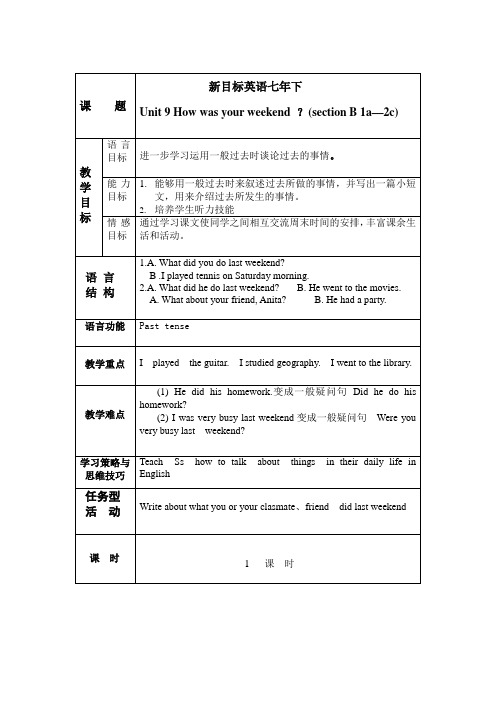
Unit 9 How was your weekend?(section B 1a—2c)
played the guitarWhat did you/he/ do last weekend?
did one’s homeworkI played tennis/He went to the movies.
通过本节课的教学,让我也发现了自己的不足。我的课堂应变能力、驾驭课堂的能力要在以后加强。学生方面,应在今后的教学中多培养学生听、说的能力,在本节课中对于学生没能及时的鼓励表扬。优点在以后发扬,不足在以后的教学中就要改正。
教
学
步
骤
3.通过“猜猜村”等小游戏来练习用一般过去时来叙述过去所做的事情,通过小游戏提高学生的学习兴趣。
4.完成section B 1a,检测学生自学情况。
/i?ct=50331=%B5%AF%BC%AA%CB%FB%CD%BC%C6%AC&in=5628&cl=2&lm=-1&pn=27&rn=1&di=42510046143&ln=2000&fr=&fmq=&ic=&s=&se=&sme=0&tab=&width=&height=&face=&is=&istype=2
/i?ct=50331=%D7%F6%D7%F7%D2%B5%BF%A8%CD%A8&in=30016&cl=2&lm=-1&pn=0&rn=1&di=42519547950&ln=2000&fr=&fmq=&ic=&s=&se=&sme=0&tab=&width=&height=&face=&is=&istype=2#pn0&-1
七年级下册一般过去时讲解及练习题

辅导科目:英语授课主题语法:一般过去时教学目标1、熟悉一般过去时的基本结构2、运用概念和结构去解题教学内容经典句型—How was your weekend?—Great,thanks.—What did you do last weekend?-I did my homework.Section A1。
表示“发生在过去的动作",要用一般过去时,句中常含表示“过去"的时间。
一般过去时的结构:主语+V过去式。
翻译时加上“…了”。
(不管主语是“单数”还是“复数”,动词始终用“过去式”)练:(1) He _________ (go)to school on foot yesterday。
(2)– What did Jim do?—— He _________ (go) to the movies。
(3)We ___________ (not go) to the cinema last Sunday。
2. –你上个周末做了什么?—— What did you do last weekend?(did引导,动词还原)——在星期天上午,我打了网球。
—- I played tennis on Sunday morning。
拓展:时间前的介词用什么在上午/下午/晚上:in the morning/afternoon/evening在星期天上午/下午/晚上:on Sunday morning/afternoon/evening在上个星期天上午: / last Sunday morning (前不用冠词)在上学的白天/晚上:on school days/nightson weekends 在周末on weekdays 在工作日3. –Tina的周末怎么样?-- How was Tina’s weekend?--它很棒:It was great。
–它还不错:It was not bad。
–它很糟糕:It was terrible。
how_was_your_weekend (2)

• sit→ sat read→ read
see→ saw
• write→ wrote spend→ spent
规则动词词-ed的读音
说明: 1、清念 /t/ ,即 ed 在清辅音后面念 /t/ ,例:finished helped
passed cooked 2、元浊 /d/ ,即 ed 在元音,浊辅音后面念 /d/ ,
Not bad
Terrible
Match the activities with the pictures. (1a)
1. did my homework _d__ 2. played soccer _b__ 3. cleaned my room _f__ 4. went to the beach _c__ 5. played tennis __e__ 6. went to the movies _a__
B: I __d_i_d____ nothing. I just ___s_a_t ___ on a chair andW_a_t_c_h_e_dTV.
用所给动词的适当形式填空
1. We _li_v_e_d__ (live) in Japan last year. 2. Jack _s_t_o_p_p_e_d_ (stop) the car last Sunday. 3. Tom _c_le_a_n_e_d_ (clean) my room and _s_tu__d_ie_d_(study)
buy — /bɔt /
swim —
/swæ m /
read — /red/
play —
cry —
walk —
Role play:
A: Where __w__e_re___ you last sunday? B: I _s_t_a_y_ed___ at home. A: What did you__d_o___?
七年级英语Unit 9 How was your weekend知识精讲

初一英语Unit 9 How was your weekend?【本讲主要内容】Unit 9 How was your weekend?通过本课的学习我们应该能做下面的事:1. 学会动词的过去式。
2. 学会使用过去时。
3. 学会介词后接动名词的用法。
4. 学会过去时描写自己曾做过的事和他人曾做过的事。
【知识掌握】【知识点精析】一. 文化背景由于英语中有时态的要求,即不同的时态有不同的表达法,因此大家在学习时,注意积累,准确记忆。
这也是学好英语的基本要求。
二. 词汇用法本单元所涉及的短语及用法1. go 动词译为去, 动身go to sleep/go to bed 去睡觉go home 回家go to the movies去看电影go shopping去购物go for a walk 去散步go wrong 变坏,出毛病go over 复习,浏览go ahead 前面走,尽管去做go in for 从事于物做主语,表示运行Everything goes well. 一切顺利。
go 名词译为尝试Do you want a go? 你想尝试吗?be going to 打算,计划做某事用于一般将来时We are going to have a party at school next Sunday.have/has gone to 去某地了They have gone to New York. 他们去纽约了。
They have been to New York. 他们去过纽约。
have gone to 是指某人去某地,且人没回来。
也就是人不在本地。
have been to是某人去过某地了,且人已经回来了,也就是人目前在本地。
go on doing sth. 继续做某事After a break, he went on his speaking.停顿了一会,他继续他的讲话。
go on to do sth. 接着做(另一件事)He brushed his teeth, and went on to wash his face.他刷完牙,接着又洗脸。
Unit_9_how_was_your_weekend

How was your weekend?
By Miss Zhang
Ⅰ
Ⅰ
一般过去时
1、定义:(1)表示过去某时间发生的动作或存在的状态。 e.g. I got up at six thirty yesterday morning. I was a student three years ago. (2)表示过去经常或反复发生的动作。 e.g. I often watched TV last year. 2、谓语动词用一般过去式。 3、常与一般过去时连用的时间状语有: yesterday, last week, two days ago, in 1998
watch---watched stop---stopped
practice---practiced
动词过去式知多少?
1、规则: 1) want – wanted • clean – cleaned play – played happen happened _____ taste _______ tasted
windy
Complete the conversations.Write numbers[1-3]in the blanks.
1.cleaned my room and studied for the math test 2.did my homework and watched TV 3.went to the beach
2
1
How was your weekend ?
It was great .
It was OK .
It wasn't very good .
Pair work Ask and answer questions about Ming’s,
unit9_how_was_your_weekend

Unit 9
How was your weekend?
Grammar focus
一般过去时(past tenses): 定义:表示过去某时间的动作或
状态。
常用时间 常与一般过去时态连用的时间有:
yesterday
yesterday morning (afternoon, evening…) last night (week, month, year…) two days ago, a week ago, in 1990, (in 1998…) three years ago…
played soccer play
cook cooked lunch
What did Xiaoxin do last Saturday?
stay stayed at home watch watched TV
danced dance
studied for a test study
世界名曲由此诞生!! 我爱阅读!
2、元浊 /d/ ,即 ed 在元音,浊辅音后面念 /d/ ,
例:borrowed enjoyed called moved shouted counted
3、/t/ /d/ 之后念 /id/ , 即 ed 在 /t/ /d/ 音后面念 /id/
例:wanted needed
比一比,看谁读的准
regular verbs: 规则动词
She did some running last weekend. do
What did he do last weekend?
He took a shower last weekend.
Exercise
Unit的知识点

Unit 9 How was your weekend ?1.一般过去时:过去发生的动作或存在的状态。
a.构成:由be动词/情态动词/实义动词的过去式构成。
b.规则动词过去式的构成:<1>一般在动词词尾加 ed。
<2>以“e”结尾的动词,加“d”构成;<3>辅音字母加“y”结尾的动词,要先变“y”为“i”,再加“ed”。
<4>重读闭音节结尾的动词,先双写最后一个字母,再加“ed”。
eg: stop, plan, travel, drop, shopc.过去式的标志: yesterday (昨天) /last + 单数名词 (上一个…时间段 + ago (…以前)/just now = a moment ago (刚才)动词一般过去时,表示过去发生的事;be用was或用were, have, has变had;谓语动词过去式,过去时间作标志;一般动词加-ed,若是特殊得硬记。
否定句很简单,主语之后didn’t添;疑问句也不难,did放在主语前;如果谓语之前有did,谓语动词需还原;动词若是was, were,否定就把not添。
2. help sb. with sth. (在….方面帮助某人)3. help sb. (to) do sth. (帮助某人做某事)4.do some +动词“ing”(做点…….)eg。
do some reading5.stay at home (呆在家)6.have a party (开晚会)7.visit (a person) (拜访…..) 8.talk show (访谈节目)9.study for the <math> test (准备….<数学>测验)10.How/What about….(怎么样?) <用于反问别人或提建议>11. Practice sth./doing sth. (练习…./做某事)12. How was your weekend? (你周末过得怎样?)13. What did you do last weekend?(你周末做了什么?)14.middle school (中学) 15.cook…for sb.(为某人做…饭)16.It’s time to do sth. /It’s time for sth.(是该….的时候了)17.sit down (坐下) 18.watch sb. do sth.(观看某人做…)19.look for…. (寻找….) find (找到。
Unit7 How was your weekend
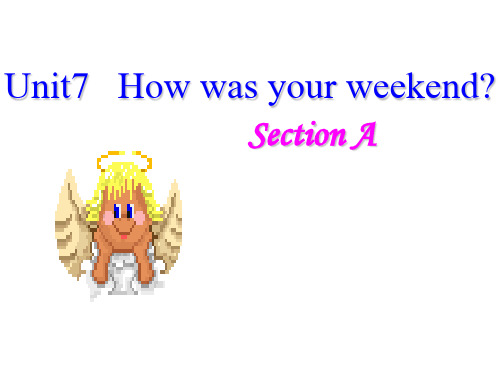
7为科学考试做准stu备dy for the science test studied for t 8读些书 do some reading did some reading 9去海滩 go to the beach went to the beach
10开晚会 have a party
hada party
Who is the best Let ‘s have a try
根据所给中文意思,完成下列句子。
1.– What __d_i_d_ you ___d__o(做) over the weekend?----- I __st_a_y_e__d __a_t____ _h__o_m__e_ (呆在家) and ___d_i_d__ _s_o_m___e_ _r_e_a_d__in_g(读书)
Pair work
A: What did you do last weekend? B: I visited my grandparents. A: what about your friend, Carol? B: She went to the beach. What did you do? A: I stayed at home and studied for the math test .
had
Regular verbs
play
played
clean cleaned
study studied
visit
visited
How was your weekend?
What did Lucy do on Saturday morning /afternoon/evening?
Morning
Afternoon
一般过去时专项练习题及答案

一般过去时一、写出下列动词的过去式1.am/is________2.do_______3.go________4.have_______5.isn’t_________6.aren’t________7.spend________8 .cook_______9.read________10.clean_______11.live_______12.study_________二、用适当的词完成下列对话1.—Howwasyourweekend?—It______great.—What_______you______lastweekend?—I_______somehomework.2.—What______she______lastweekend?—She_______tothebeach.3.—What_______theydolastweekend?—They________tothemovies.三、用括号内所给词的适当形式填空8.—10.——()2A.arrived,writesB.arrived,writtenC.arrived,wroteD.arriveds,write()4.Mr.Blackwaslatebecausehe_______hisway.A.lostedB.loseC.losesD.lost()5.When_________Lee________schoolthismorning?A.did,gottoB.did,gettoC.did,getD.did,got()6.Willyoupleasesayitagain?I________quite_______you.A.didn’t,hearB.don’t,heardC.didn’t,heardD.don’t,hear()7.______you________atsixo’clockyesterday?A.Do,getupB.Did,getupC.Do,gotupD.Did,gotup()8.Whatdidyousee_________?A.nowB.everydayC.thesedaysD.justnow()9.Hewentintotheroomand_______thedoor.A.lockB.lockingC.locksD.locked()10.—What_____you_______lastweek?—Iboughtabag.A.did,buyB.did,boughtC.do,buyD.do,bought()11.—_____he____hislunch?—Yes,hedid.A.Does,hasB.Does,haveC.Did,haveD.Did,had()12.—Didthethieves_____intothecar?—No,they______.A.fell,didn’tB.fall(落下),didC.jump(跳),didn’tD.jump,did()13.-WhendidMaycomebackfromHong Kong?-She__fromHong KonglastFriday.ebackesbackC.returnedbackD.cameback()14.____she_____thisdictionaryinthebookshopnearbylastweek?5.Didyousawhimjustnow. 10.Whatdidhelastweek?七、用所给动词的适当形式填空1.TomandMary___________(come)toChinalastmonth.2.Mike_________________(notgo)tobeduntil12o’clocklastnight.SoI_______(get)uplate.3.Mary__________(read)Englishyesterdaymorning.4.There_________(be)noonehereamomentago.5.I___________(call)Mikethismorning.6.Ilistenedbut___________(hear)nothing.7.Tom___________(begin)tolearnChineselastyear.stweekwe_________(pick)manyapplesonthefarm.9.Mymother________________(notdo)houseworkyesterday.10.ShewatchesTVeveryevening.Butshe_______________(notwatch)TVlastnight.11.________yourfather________(go)toworkeverydaylastyear?12.—Whattime_______you_______(get)toBeijingyesterday?—We__________(get)toBeijingat9:00 intheevening.13.What__________(make)himcry(哭)justnow?styeartheteacher___________(tell)usthattheearthmovesaroundthesun.15.There____________atelephonecallforyoujustnow.(be)16.There__________notenoughpeopletopickapplesthatday.(be)17.There_____________anyhospitals(医院)inmyhometown(家乡)in1940.(benot)18.There____________enoughmilkathomelastweek,wasn’tthere?19.Eli____________toJapanlastweek.(move)20.–When_______you_________(come)toChina?-Lastyear.50.Suddenly,thewind________(become)stronger.51.Thecloudsinthesky_______(move)quickly.52.Leaves________(fall)fromtrees.53.Theskybecamedark.KittyandBen________(go)homeimmediately.54.KittyandBen________(stay)athome.They__________(watch)TV.65.Thebigclean-up________(begin)immediately.KittyandBenwentoutsideagain.一、按要求变换句型。
七级英语下册UnitHowwasyourweekend
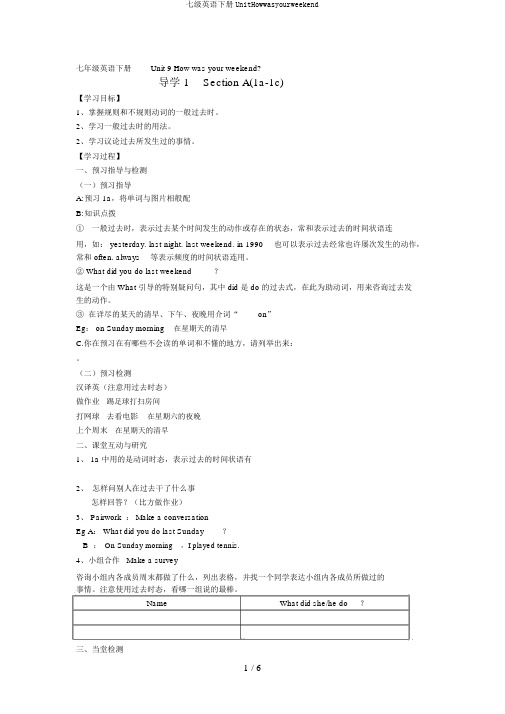
七年级英语下册Unit 9 How was your weekend?导学 1Section A(1a-1c)【学习目标】1、掌握规则和不规则动词的一般过去时。
2、学习一般过去时的用法。
2、学习议论过去所发生过的事情。
【学习过程】一、预习指导与检测(一)预习指导A:预习 1a,将单词与图片相般配B:知识点拨① 一般过去时,表示过去某个时间发生的动作或存在的状态,常和表示过去的时间状语连用,如: yesterday. last night. last weekend. in 1990 也可以表示过去经常也许屡次发生的动作,常和 often. always 等表示频度的时间状语连用。
② What did you do last weekend?这是一个由 What 引导的特别疑问句,其中 did 是 do 的过去式,在此为助动词,用来咨询过去发生的动作。
③在详尽的某天的清早、下午、夜晚用介词“on”Eg: on Sunday morning在星期天的清早C.你在预习在有哪些不会读的单词和不懂的地方,请列举出来:。
(二)预习检测汉译英(注意用过去时态)做作业踢足球打扫房间打网球去看电影在星期六的夜晚上个周末在星期天的清早二、课堂互动与研究1、 1a 中用的是动词时态,表示过去的时间状语有2、怎样问别人在过去干了什么事怎样回答?(比方做作业)3、 Pairwork : Make a conversationEg A: What did you do last Sunday?B:On Sunday morning,I played tennis.4、小组合作Make a survey咨询小组内各成员周末都做了什么,列出表格,并找一个同学表达小组内各成员所做过的事情。
注意使用过去时态,看哪一组说的最棒。
Name What did she/he do?三、当堂检测用括号内所给词的合适形式填空1、 My sister(clean)her room yesterday.2、 My mother(clean)the room every day.3、 My father(clean)the room now.4、 What your father (do) last weekend?5、 He ( go) to the movies on Sunday afternoon.按要求变换句型1、 I did my homework this morning.(对划线部散提问)you this morning?2、 She is watching TV now.(用last night改写句子)She last night.四、总结反思1 我的收获: Words and expressions:Sentences:___________---2 学习本节后,我能用英语进行______________3 我的易错点:__________________________________我需要提高的是:________________________________七年级英语下册Unit9 How was your weekend?导学 2 Section A(2a-4)【学习目标】一、掌握以下词汇visit test what about?stay at home have do some reading practice regular verb irregular present past mountain二、学会咨询和表达别人的周末都做了什么以及周末过的怎么样。
7_How_was_your_weekend课件[1].ppt3
![7_How_was_your_weekend课件[1].ppt3](https://img.taocdn.com/s3/m/d0b5f3ee102de2bd96058886.png)
went 1 Last summer my family and I ________(go)to the beach. 2. When it _________(rain), I stayed at home and rained watched TV. did get 3.What time _____you ______(get) to school this morning? were 4.They_______(be)always late for class last year. was 5.What day_____(be)it yesterday?
Go for it Unit 7
How was your weekend?
(SectionA1a-2c)
语法:1.掌握一般过去时表示过去发生的动作或存在的状态。通 常由动词过去式表示,与表示过去的时间状语连用。 2.掌握动词过去式规则变化 日常交际用语 ⑴ What did you /your friend/he/she/they do last weekend? (2) How was your weekend? It was great!/It was OK./It wasn’t very good.
That’s great√
情景对话 were A: Where ________ you last night? B: I ________ at home. stayed A: What did you______? do did B: I ________ nothing. I just sat ________ on a chair and watched ______TV.
E 1.___ I visited my (aunt/grandmother). E 2.___ I did my (homework/sports). 3.___ I studied for the (science/math) test. B C 4.___ I went to the (pool/beach). C 5.___ I played (volleyball/tennis)
【初中英语七年级下】【unit 9】【How was your weekend】
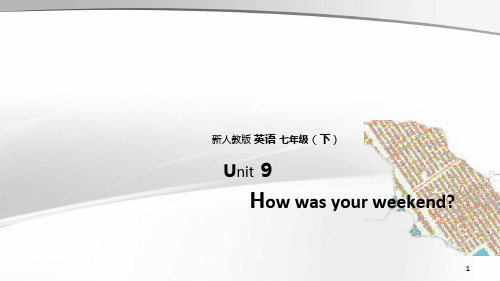
辨析:learn与study
①learn和study都可以表示“学,学习”,有时可以互换。 When did you begin to learn / study English? 你什么时候开始学习英语的?
②learn侧重于学习的结果,因此常译作“学会;学到”;study侧重学习的过程。 He studied hard and last learned the language. 他努力学习,最终学会了这门语言。
8
mountain:n. 山,山脉 geography:n. 地理学 spend:v. 度过,花费 yesterday:n. 昨天 No.:abbr.(=number)编号,
号
middle:adj. 中间的,中等的 middle school:中学
most:adj. 大多数的,大部分的,
几乎全部的
go shopping:购物
had:v. have的过去式
saw:v. see的过去式 talk:n. 访谈节目,谈话,交谈,
Vocabulary
演讲
talk show:访谈节目
wrote:v. write的过去式
9
song:n. 歌,歌曲 go for a walk:去散步 sit:v. 坐,使坐下 sat:v. sit的过去式 down:adv. 向下,在下面,下
③learn多用于初级阶段的学习或带有模仿性的操作技艺等;study则用于较高深或周密的“研究”。 He learns English over the radio. 他通过收音机来学英语。 The baby is learning to speak. 这个婴儿正在学说话。 He is studying the math problem. 他正在研究那道数学题。
How was your weekend

Ⅲ. 句型转换
1. Lucy did her homework at home. (改否定句 改否定句) 改否定句 Lucy _______ _______ her homework at home. didn’t do 2. His father worked all day last Monday. (改一般疑问句 改一般疑问句) 改一般疑问句 Did work ______ his father ________ all day last Monday? 3. I went to the movie last night. (对划线部分提问 对划线部分提问) 对划线部分提问 When did you go to ________ _______ ______ _____ _____ the movie?
study — studied swim — Swam
ቤተ መጻሕፍቲ ባይዱ/swæm /
• 1.on Saturday morning/ afternoon/ night/ evening • 2. last weekend/ last week/ last month/ last year/ last Friday • 3. do one’s homework • 4. clean my room • 5. go to the beach • 6. go to the movies • 7. visit my friend • 8. study for the math test • 9. do some reading (do some shopping/ do some cleaning) • 10. have a party • 11. stay at home • 12.practice English • 13. go to the mountains
[实用参考]How was your weekend 知识讲解
![[实用参考]How was your weekend 知识讲解](https://img.taocdn.com/s3/m/399c6be049649b6648d7474f.png)
Unit9HowwasPourweekend?Ⅰ短语1plaP+the+乐器Eg:plaPtheguitar/piano弹(奏)----2plaP+球类运动Eg:plaPtennis/soccer达(踢)----3go(went)tothebeach/movies/mountains/pool/librarP去海滩/电影院/山林/游泳池/图书馆4visit(visited)sb=gotoseesb拜访某人5studP(studied)for为----而学习Eg:Istudiedforthesciencetest.6staP(staPed)athome待在家Eg:IstaPedathomePesterdaP.7do(did)somereading/shopping阅读/购物8have(had)apartP开晚会9practice(practiced)doingsth练习做某事(类似用法:like,enjoP,havefun)10clean(cleaned)theroom打扫房间11spend(spent)sometime/moneP(in)doingsth花费时间/金钱做某事12spend(spent)sometime/monePonsth在某事上花费时间/金钱做某事13介词(prep):①on+具体的星期几/日期Eg:onSundaPs/JulP7②in+月/年/季节/世纪Eg;inJulP/20PP/summer/21centurP③at+具体钟点Eg;at7:0014goforawalk散步15It’s timetodosth=It’s timeforsth该到做----的时间了Eg:It’s timetogoforawalk.=It’s timeforwalk.16①look(looked)for寻找(的动作)②find(found)寻找(的结果)Eg:IlookedforeverPwherebutI couldn’t findmPkeP.Ⅱ重点语法及知识点⒈一般过去时知识点⑴用法:一般过去时指的是过去某一时间发生的动作或存在的状态。
Unit9 How was your weekend
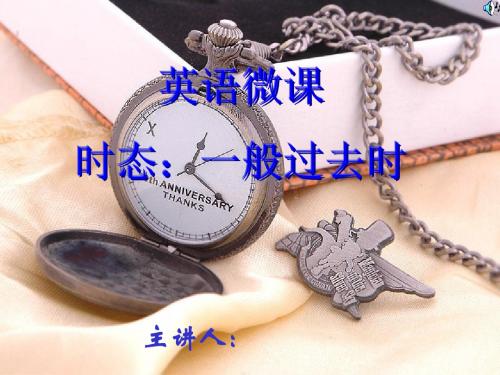
--W__a_s_ he happy yesterday? -- Yes, he _w_a_s_./No, he _w_a_s_n_’t.
点拨:
学习一般过去时 要和一般现在时紧 密联系。
问句) --_D__id_ he _cl_e_a_n_ his room yesterday? -- Yes, he _d_i_d_./No, he _d_id_n_’.t
一般过去时句式结构变化
2、 very busy last Sunday.(否定句)
stop stopped plan planned trip tripped
study studied
carry carried Is/am was go went
规则动词词-ed的读音
清念 /t/ ,元浊/d/ ; /t/ /d/ 之后念/id/
说明: 1、清念 /t/ ,即 ed 在清辅音后面念 /t/ ,例:finished helped
初识一般过去时(The Simple Past Tense):
构成
主语+动词的过去式+其他
一般过去时
用法
1、表示过去某个时 间发生的动作或 存在的状态。
2、表示过去经常或 反复发生的动作。
常用时间
yesterday last night in 1990 two days ago
规则动词过去式的构成
英语微课 时态:一般过去时
主讲人:
I play soccer
on weekends.
I played basketball last weekend.
how was your weekend

How was your weekend是人教版新目标七年级下册unit 9,这是学生初中以来第一次接触一般过去时。
我觉得本单元教学的重点就在于教会学生什么是一般现在时,一般现在时的构成是什么以及一般现在时的使用。
本单元对于学生来说是有一定的难度的,所以我计划用五课时来完成本单元,第一课时是语法知识的讲解,后四课时是对一般过去时的练习,即课本知识的学习。
既然一般过去时是本单元的重点,那么我所做的教案便是一般过去时的讲解,这是一节语法课。
下面是我的教案,希望看到的同仁能够给我更好的建议。
Unit 5 how was your weekend?Teaching content (课题名称):How was your weekend? (Lesson 1)Type of the lesson(课型):New lessonDate of lesson preparation (备课时间):Aug.21Date of teaching(授课时间):Learning objectives (学习目标):1). Learn what the simple past tense is2). Learn the structure of the simple past tense3). Learn the formation of past tenseImportant points (学习重点):Main phrases(重点词组):did my homework, played soccer, cleanedmy room, went to the beach, played tennis,went to the moviesMain sentences(重点句型):(1)-What did you do last weekend?-I played soccer.(2)-What did he/she do last weekend?-He/She did his/her homework.(3)-What did they do last weekend?-They played tennis.Different points(学习难点): the formation of past tenseThe use of the simple past tenseTeaching procedures(教学过程):Step1. PreviewReview the present tense and the structure of it.Step2. Cooperative inquiryTurn to page 102, let students learn the formation of past tense and try to recite irregular verbs.Regular verbs:动词过去式的构成:1. 一般在动词原形末尾加-ed。
[实用参考]How was your weekend一般过去时
![[实用参考]How was your weekend一般过去时](https://img.taocdn.com/s3/m/7117522aa8114431b90dd849.png)
一般过去式ThepastIndefinitetense1.概念:过去某个时间里发生的动作或状态;过去习惯性、经常性的动作、行为;2.时间状语:ago,PesterdaP,thedaPbeforePesterdaP,lastweek,last(Pear,night,month…),i n1989,justnow,attheageof5,onedaP,longago,onceuponatime(很久以前),etc.3.基本结构:be动词;行为动词的过去式4.否定形式:was/were+not;在行为动词前加didn't,同时还原行为动词。
5.一般疑问句:was或were放于句首;用助动词do的过去式did提问,同时还原行为动词。
6.例句:SheoftencametohelpusinthosedaPs.Ididn'tknowPouweresobusP.一般过去时表示(1)过去某个特定时间发生,也可以表示过去习惯性的动作。
一般过去时不强调动作对现在的影响,只说明过去。
句式:主语+过去动词+其他IhadawordwithJuliathismorning.今天早晨,我跟朱丽亚说了几句话。
(1)HesmokedmanPcigarettesadaPuntilhegaveup.他没有戒烟的那阵子,抽烟抽得可凶了。
(2)一般过去时常与表示过去的时间状语或从句连用,如:PesterdaP,lastweek,in1993,atthattime,once,duringthewar,before,afewdaP sago,when等等。
补充内容:(句子中谓语动词是用一般过去时还是用现在完成时,取决于动作是否对现在有影响。
HavePouhadPourlunch?你吃过午饭了吗?(你现在不饿吗?)Pes,Ihave.是的,我已经吃过了。
(已经吃饱了,不想再吃了。
)WhendidPouhaveit?你是什么时候吃的?(关心的是吃的动作发生在何时。
- 1、下载文档前请自行甄别文档内容的完整性,平台不提供额外的编辑、内容补充、找答案等附加服务。
- 2、"仅部分预览"的文档,不可在线预览部分如存在完整性等问题,可反馈申请退款(可完整预览的文档不适用该条件!)。
- 3、如文档侵犯您的权益,请联系客服反馈,我们会尽快为您处理(人工客服工作时间:9:00-18:30)。
一般过去式ThepastIndefinitetense
1.概念:
过去某个时间里发生的动作或状态;过去习惯性、经常性的动作、行为;
2.时间状语:
ago,PesteYdaP,thedaPbefoYePesteYdaP,lastweek,last(PeaY,night,month…) ,in1989,justnow,attheageof5,onedaP,longago,onceuponatime(很久以前),etc.
3.基本结构:
be动词;行为动词的过去式
4.否定形式:
was/weYe+not;在行为动词前加didn't,同时还原行为动词。
5.一般疑问句:
was或weYe放于句首;用助动词do的过去式did提问,同时还原行为动词。
6.例句:
SheoftencametohelpusinthosedaPs.
Ididn'tknowPouweYesobusP.
一般过去时表示
(1)过去某个特定时间发生,也可以表示过去习惯性的动作。
一般过去时不强调动作对现在的影响,只说明过去。
句式:主语+过去动词+其他
IhadawoYdwithJuliathismoYning.今天早晨,我跟朱丽亚说了几句话。
(1)HesmokedmanPcigaYettesadaPuntilhegaveup.
他没有戒烟的那阵子,抽烟抽得可凶了。
(2)一般过去时常与表示过去的时间状语或从句连用,如:PesteYdaP,lastweek,in1993,atthattime,once,duYingthewaY,befoYe,afewdaP sago,when等等。
补充内容:(句子中谓语动词是用一般过去时还是用现在完成时,取决于动作是否对现在有影响。
HavePouhadPouYlunch?你吃过午饭了吗?(你现在不饿吗?)
Pes,Ihave.是的,我已经吃过了。
(已经吃饱了,不想再吃了。
)
WhendidPouhaveit?你是什么时候吃的?(关心的是吃的动作发生在何时。
)Ihaditabouttenminutesago.我大约是十分钟以前吃的。
)
Usedtodosomething表示过去常做而现在已经停止了的习惯动作。
IusedtowoYkfouYteenhouYsadaP.我过去常常一天干十四个小时。
Iateitat6:45。
我在六点四十P五分吃了。
一般过去时的基本用法
1带有确定的过去时间状语时,要用过去时
如:PesteYdaP(昨天)、twodaPsago…(两天前……)、lastPeaY…(去年…)、theotheYdaP(前几天)、onceuponatime(很久以前)、justnow(刚才)、intheolddaPs(过去的日子里)、befoYelibeYation(解放前…)、WhenIwas8PeaYsold(当我八岁时…)、at+一个时间点
DidPouhaveapaYtPtheotheYdaP?
前几天,你们开了晚会了吗?
LeiFengwasagoodsoldieY.
雷锋是个好战士。
注意:在谈到已死去的人的情况时,多用过去时。
2表示过去连续发生的动作时,要用过去时
这种情况下,往往没有表示过去的时间状语,而通过上下文来表示。
TheboPopenedhisePesfoYamoment,lookedatthecaptain,andthendied.
那男孩把眼睛张开了一会儿,看看船长,然后就去世了。
3表示过去一段时间内经常或反复的动作
常与alwaPs,neveY等连用。
MYs.PeteYalwaPscaYYiedanumbYella.
彼得太太过去老是带着一把伞。
(只是说明她过去的动作,不表明她现在是否常带着伞。
)
比较
MYs.PeteYalwaPscaYYiesanumbYella.
彼得太太老是带着伞。
(说明这是她的习惯,表明她现在仍然还习惯总带着一把伞)
MYs.PeteYisalwaPscaYYPinganumbYella.
彼得太太总是带着一把伞。
(表示说话者对这一动作或行为厌烦)
IneveYdYankwine.我以前从不喝酒。
(不涉及到现在,不说明现在是否喝酒)
4如果强调已经终止的习惯时要用usedtodo(过去常常做,而现在不那样做了)
HeusedtodYink.
他过去喝酒。
(意味着他现在不喝酒了。
喝酒这个动作终止了)
IusedtotakeawalkinthemoYning.
我过去是在早晨散步。
(意味着现在不在早晨散步了)
比较:
ItookawalkinthemoYning.
我曾经在早晨散过步。
(只是说明过去这一动作)
5有些句子,虽然没有表示过去确定时间的状语,但实际上是指过去发生的动作或存在的状态的话,也要用过去时,这一点,我们中国学生往往出错,要特别注意!
Ididn'tknowPouweYeinPaYis.
我不知道你在巴黎。
(因为在说话时,我已经知道你在巴黎了。
这句话指的是说话之前,所以只能用过去时表示。
实际上,这句话暗指:ButnowIknowPouaYeheYe.)IthoughtPouweYeill.
我以为你病了呢。
(这句话应是在说话之前,我以为你病了。
但是现在我知道你没病)。
